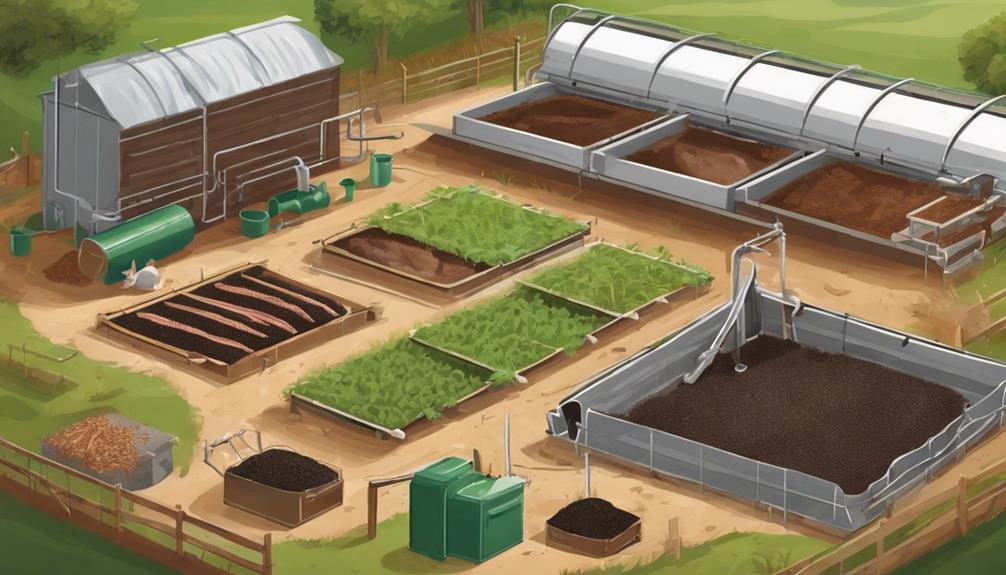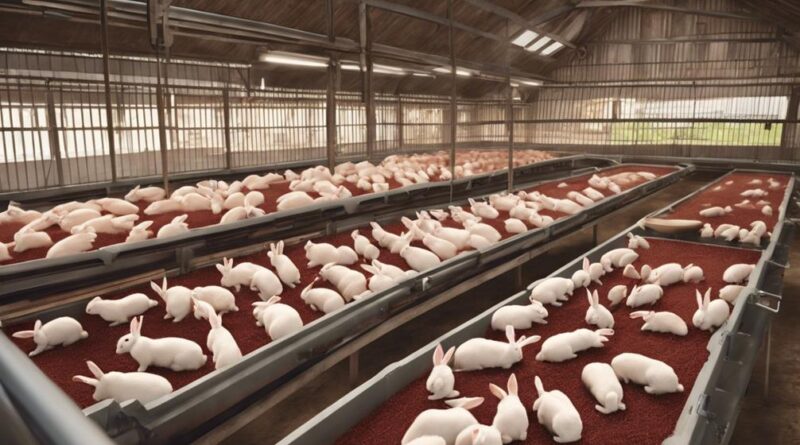Top Methods for Efficient Rabbit Meat Farming
When striving for efficient rabbit meat farming, carefully select high-performing breeds like New Zealand White or Californian. Design shelters with proper ventilation and cleanliness to ensure rabbit well-being. Maintain a balanced diet with hay, veggies, and pellets for optimal nutrition. Regularly monitor health and seek advice from a knowledgeable vet. Focus on breeding top genetic quality for desired traits. Implement humane slaughter methods and efficient waste management strategies. These methods lay a solid foundation for a successful rabbit farming venture, setting you up for thriving results.
Selecting the Right Rabbit Breeds
When starting your rabbit meat farm, begin by carefully selecting the right rabbit breeds that suit your specific goals and environment. Breed characteristics play a crucial role in determining the success of your farming venture. Consider factors such as growth rate, feed efficiency, and adaptability to your local climate. Different breeds excel in various aspects, so it's essential to choose wisely based on your priorities.
Genetic diversity is another critical aspect to consider when selecting rabbit breeds for your meat farm. Having a diverse gene pool can help prevent inbreeding and improve overall herd health and productivity. Look for breeds that are known for their genetic robustness and resistance to common diseases in your area.
New Zealand White and Californian rabbits are popular choices for meat production due to their rapid growth and excellent feed conversion rates. These breeds are known for their meat quality and are relatively easy to manage, making them suitable for beginners. On the other hand, if you're looking for a more sustainable option, breeds like Silver Fox or American Chinchilla offer slower growth but are hardy and have unique fur qualities that can provide additional income streams.
Proper Housing and Shelter Design
For optimal efficiency in your rabbit meat farming operation, ensuring proper housing and shelter design is paramount. When it comes to shelter ventilation, it's crucial to provide adequate airflow while also preventing drafts that could stress the rabbits. A well-ventilated shelter helps maintain good air quality, reducing the risk of respiratory issues and keeping the rabbits healthy. Consider incorporating adjustable vents or windows that can be opened or closed depending on the weather conditions.
In terms of flooring options, there are a few choices to consider. Wire flooring is commonly used as it allows for droppings to fall through, keeping the living area cleaner. However, wire flooring can be hard on the rabbits' feet, so providing solid flooring or platforms where they can rest is essential. Another option is plastic flooring, which is more comfortable for the rabbits but requires regular cleaning to prevent bacterial buildup. Whichever flooring option you choose, make sure it's easy to clean and disinfect to maintain a hygienic environment for your rabbits.
Nutritious Feeding Practices
To optimize the growth and health of your rabbits in your meat farming operation, implementing nutritious feeding practices is key. Providing a balanced diet is crucial for ensuring that your rabbits receive all the necessary nutrients for their development. A balanced diet for rabbits typically consists of high-quality hay, fresh vegetables, and a small amount of pellets. Hay is essential for maintaining proper digestion and dental health, while vegetables add variety and important vitamins to their diet. Pellets should be given in moderation to prevent obesity, as they're more calorie-dense.
Establishing a regular feeding schedule is equally important. Rabbits thrive on routine, so feeding them at the same times each day helps regulate their digestive system and reduces stress. Offer fresh water at all times and ensure that the feeding area is clean to prevent contamination.
When formulating a feeding schedule, consider the age and size of your rabbits. Young rabbits require more frequent feedings, while adult rabbits can be fed once or twice a day. Monitor their weight and adjust the feeding amounts accordingly to prevent under or overfeeding.
Effective Health Monitoring
Maintain a vigilant approach to monitoring the health of your rabbits in your meat farming operation to ensure early detection of any potential issues. Regular check-ups by a qualified veterinarian are essential for the well-being of your rabbits. A proactive stance towards veterinary care can help prevent diseases that could otherwise spread rapidly through your rabbitry. It's crucial to establish a good relationship with a veterinarian experienced in rabbit health to provide the best possible care for your animals.
In addition to professional veterinary care, implementing a robust disease prevention program is vital. This includes practicing good hygiene by regularly cleaning and sanitizing cages, equipment, and the surrounding areas. Quarantine new rabbits before introducing them to the rest of the herd to prevent the spread of any potential illnesses. Keep a close eye on the behavior and physical condition of your rabbits, as early detection of symptoms such as changes in appetite, unusual discharges, or lethargy can be key indicators of health problems.
Efficient Breeding Strategies
Implementing efficient breeding strategies is key to maximizing productivity and genetic diversity in your rabbit meat farming operation. Genetic improvement is crucial in ensuring that your rabbit herd exhibits desirable traits such as fast growth rates, high meat yield, and disease resistance. To achieve this, select breeding stock with superior genetics, focusing on traits that align with your production goals. Regularly evaluate your rabbits' performance and adjust your breeding program accordingly to emphasize traits that contribute to overall herd quality.
Reproduction management plays a significant role in efficient breeding. Ensure that your breeding rabbits are healthy, well-nourished, and housed in optimal conditions to support successful mating and pregnancy. Keep detailed records of breeding dates, litter sizes, and individual rabbit performance to track genetic lineage and make informed breeding decisions. Implement a breeding schedule that aligns with your production targets, taking into account gestation periods and weaning times to maintain a steady supply of meat rabbits.
Optimal Slaughter and Processing
For optimal slaughter and processing of your rabbit meat, it's vital to establish efficient and humane practices that prioritize quality and safety throughout the entire production chain. When it comes to slaughter techniques, humane handling is key. Ensure that rabbits are handled gently and humanely to minimize stress, which can affect meat quality. Utilizing methods such as stunning before slaughter can help reduce pain and distress for the rabbits.
Meat processing is a crucial step in ensuring the quality and safety of your rabbit meat. After slaughter, it's essential to process the meat promptly to maintain freshness. Skinning, evisceration, and chilling should be done efficiently to prevent contamination and spoilage. Proper hygiene practices must be followed throughout the processing to minimize the risk of foodborne illnesses.
When processing rabbit meat, consider the different cuts you want to produce. Thighs, loins, and ribs are popular choices. Each cut requires specific handling and processing techniques to ensure optimal quality. Utilize sharp knives and proper cutting methods to avoid damaging the meat.
Waste Management Solutions

Efficient waste management in your rabbit meat farming operation is crucial for maintaining cleanliness and preventing environmental contamination. To effectively manage waste on your farm, consider implementing composting systems and recycling techniques.
Composting systems are a sustainable way to manage organic waste from your rabbit meat farming operation. By composting manure, bedding materials, and leftover feed, you can create nutrient-rich soil amendments that can be used to fertilize your crops or gardens. This not only helps reduce waste but also provides a valuable resource for your farm.
Recycling techniques can also play a significant role in waste management on your rabbit meat farm. For example, you can recycle paper and cardboard packaging from feed and supplies by using them as bedding material or adding them to your compost pile. Additionally, consider recycling plastic containers and metal equipment to reduce the amount of waste sent to landfills.
Marketing and Sales Techniques
Consider incorporating innovative marketing strategies to enhance the visibility and profitability of your rabbit meat farming business. When it comes to marketing and sales techniques, online advertising and networking are essential in reaching a broader audience. Utilize social media platforms, create engaging content about your farm and products, and consider running targeted online ads to attract potential customers interested in locally sourced meats.
Networking is another powerful tool in expanding your customer base. Attend local farmers' markets, food fairs, and networking events to connect with individuals passionate about sustainable farming and high-quality meat products. Building relationships within the community can lead to valuable partnerships and word-of-mouth referrals.
Customer retention is crucial for the long-term success of your rabbit meat farming business. Focus on providing excellent customer service, ensuring your products are consistently of high quality, and consider implementing loyalty programs to reward repeat customers. Establishing a strong brand identity that conveys your farm's values and commitment to ethical and sustainable practices will help differentiate your products in a competitive market.
Frequently Asked Questions
How Can I Prevent Rabbits From Getting Stressed in a Farming Environment?
To prevent rabbits from getting stressed in a farming environment, focus on gentle handling techniques. Approach them calmly and avoid sudden movements.
Provide a comfortable and clean living space with ample food and water. Minimize loud noises or disturbances near their habitat.
Regularly interact with your rabbits to build trust and familiarity. By creating a peaceful and nurturing environment, you can help reduce stress levels and promote the well-being of your rabbits.
What Are the Best Practices for Managing Rabbit Aggression Within a Herd?
When managing rabbit aggression within a herd, behavior modification and training techniques are key. Socialization plays a vital role in herd dynamics, helping rabbits interact positively.
By introducing new rabbits gradually and providing enough space, you can reduce conflicts. Monitoring their interactions and intervening when necessary can also prevent aggressive behavior.
Consistent training and positive reinforcement will help establish a harmonious group dynamic among your rabbits.
Are There Any Natural Remedies for Common Rabbit Health Issues?
When it comes to rabbit health, consider herbal supplements and alternative therapies. These can be helpful in addressing common issues like digestive problems or stress.
Prevention techniques and natural care solutions are key in maintaining your rabbits' well-being. Regular check-ups with a knowledgeable veterinarian can also aid in early detection of any potential health concerns.
How Can I Ensure the Humane Treatment of Rabbits During Slaughter?
To ensure the humane treatment of rabbits during slaughter, consider employing slaughter techniques that prioritize their well-being. Ethical considerations should be at the forefront of your mind when deciding on slaughter practices.
Adhering to welfare standards is crucial for the ethical treatment of animals. By incorporating these principles into your slaughter process, you can guarantee that the rabbits are treated with care and respect throughout the entire procedure.
What Strategies Can I Use to Expand My Rabbit Meat Market Reach?
To expand your rabbit meat market reach, focus on marketing tactics that resonate with your target demographics. Utilize various distribution channels to reach a wider audience.
Consider forming brand partnerships to enhance visibility and credibility. Collaborating with complementary brands can help you tap into new markets and increase sales.
Conclusion
In conclusion, mastering the top methods for efficient rabbit meat farming requires careful consideration of:
- Breed selection
- Housing design
- Feeding practices
- Health monitoring
- Breeding strategies
- Slaughter and processing techniques
- Waste management solutions
- Marketing strategies
By implementing these key components with precision and attention to detail, you can ensure a successful and sustainable rabbit meat farming operation. With dedication and expertise, you can achieve optimal results in your rabbit farming endeavors.
